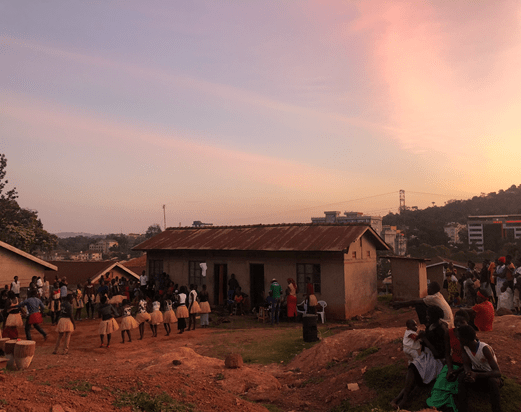Elders of the dotcom generation
By charlotte.hawkins.17, on 12 November 2020
Ladit is often considered the key authority and primary Acholi elder amongst the Lusozi community. During my research, I would be referred to him by others, and he always took the time to help me learn; hosting me in his home, telling stories to myself and my co-researcher, ‘his daughters’. He even allowed us to join as members of his savings group, Ribe Aye Teko (Unity is Strength). The time he gave us fulfilled his role as elder, to educate the younger generation about Acholi tradition.
We would often find him at home watching music videos, nature documentaries, premier league football, Nigerian soaps or chatting on WhatsApp on the phone. He believes that technology such as television, smartphones and social media has ‘brought the world together on a positive note’[1], with better entertainment and faster communication, but that it has also ‘created more problems’ for elders. According to Ladit’s interpretation, shared by many other older participants in Lusozi, individualistic and materialistic western values are broadcast and appropriated by ‘the dotcom generation’, to the detriment of respect for elders and their knowledge. He thinks the younger “dotcom generation” increasingly respect material possessions over age; ‘we are over-copying the western world and to the expense of our very beautiful peaceful traditional communal life’. This image of the past expresses what is felt to be lacking in norms and experiences today[i], an ideal of cooperation and respect to work towards, notably also with the potential to reiterate existing hierarchies and constraints[ii].
Ladit sees it as his responsibility to educate the younger generation about their ‘beautiful peaceful tradition’ of respect and togetherness, and of storytelling through music and dance, re-contextualised in the city. Other Acholi elders could criticise the ‘modernity’ of the group, one saying that “it’s coated in some plastic”. Unlike others in the village, the group does not obligate the dancers to wear traditional dress and includes music from all over the country to reflect the diversity of the area. As shown in the film below, Ladit’s traditional teachings are clearly relevant, popular and productive for the young people involved.
This includes the young male musicians and female dancers, some of whom have paid their school fees thanks to the group. It also includes the children from the neighbourhood who come and watch them practice every Sunday evening, attempting to mimic the moves. As another older Acholi woman observed of the dancing, “they train them…they like it so much…we did not drop it [tradition] down, even though it’s mixed up here”. At 67 years old, Ladit hopes his children grow old like him, so they can ‘see what he sees’ and ‘pass on knowledge of how things are done’.

Ladit (in the hat) instructing the young members of his traditional dance group before a performance at a Church function

Ladit’s traditional dance group Sunday evening practice outside his former home. Many people from across the community come to watch, especially young people and children.
[1] N.B. Interview translated
[i] Porter, Holly. ‘Moral Spaces and Sexual Transgression: Understanding Rape in War and Post Conflict’. Development and Change, 29 March 2019, dech.12499. https://doi.org/10.1111/dech.12499.
[ii] Tim Allen, ‘VIOLENCE AND MORAL KNOWLEDGE: OBSERVING SOCIAL TRAUMA IN SUDAN AND UGANDA’, The Cambridge Journal of Anthropology 13, no. 2 (1988): 45–66
One Response to “Elders of the dotcom generation”
- 1
 Close
Close





Wow, great discussion and the video, through performance, captures elements of the life course in a powerful way.